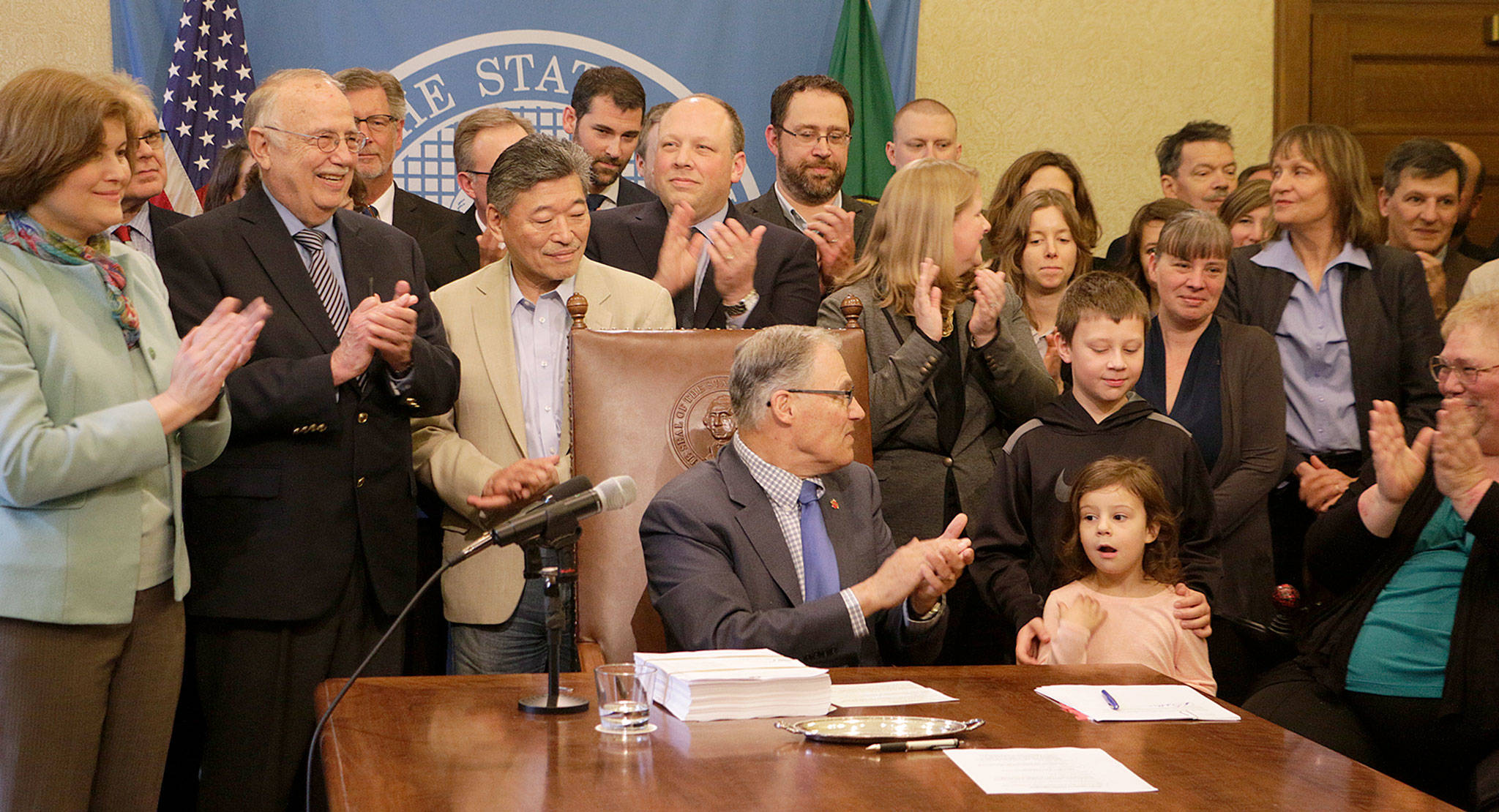OLYMPIA — Gov. Jay Inslee signed a supplemental budget Tuesday containing more than a billion dollars in new spending to provide ample state funding of public schools by a fall deadline, bolster the mental health system and cut property taxes across Washington in 2019.
The budget relies on a surge in tax collections from a booming economy to make what the governor and lawmakers think will be the last major investment in the public school system required to comply with the state Supreme Court ruling in the McCleary case.
“I would certainly hope so,” Inslee said shortly after signing the bill. “This is going to result in much more equal opportunity for students across the state of Washington. We’re not finished. This is a big achievement.”
The budget pledges $972 million to ensure the state is paying its share of basic education costs by the start of school in September, a deadline imposed by the court. Most of those dollars will go to assure the state is covering the lion’s share of teacher salaries starting this fall.
There are additional dollars for special education and other programs. And $105.2 million is set aside to pay the $100,000-a-day fine accruing since August 2015 when Supreme Court justices found the Legislature in contempt for not meeting established milestones. Justices have said the penalty must be spent in elementary and secondary schools.
The fines continue to mount, at least for now. On April 9, lawmakers will submit their annual progress report to the court and are expected to argue they have complied with the court’s 2012 ruling in the case. If the court agrees, the case could come to an end sometime this year.
“Our motivation has always been the kids,” Inslee told reporters after the bill signing. “We believe that by satisfying the McCleary decision we satisfied a higher purpose, which is our moral responsibility to our kids and our grandchildren. And I feel good about that.”
Education isn’t the only new spending in the supplemental budget. Another $231 million is going into behavioral and mental health services. Those dollars will pay for improvements at the state’s two psychiatric hospitals, complying with federal court decrees regarding evaluation and treatment for people accused of crimes, and tackling a crisis of opiate abuse.
The total includes $46.4 million to cover the anticipated accumulation of fines, attorney fees and other costs associated with the Trueblood case, which aims to eliminate long waits for mental competency evaluations and treatment for people accused of crimes.
And a chunk of the revenue windfall for the budget will provide property owners temporary relief from the whopping tax rate increase showing up on bills this year.
In 2017, to generate money to cover McCleary-related costs, lawmakers and Gov. Jay Inslee boosted the statewide tax rate to $2.70 per $1,000 assessed value. Under a bill signed Tuesday, the rate will be reduced in 2019 by 30 cents to $2.40 per $1,000 of assessed value. It will go back to $2.70 in 2020.
In all, there is an additional $1.2 billion in spending on top of the two-year $43.7 billion budget passed in June. Once reductions and adjustments in some programs are factored in, the net increase is about $900 million, according to budget documents.
Republican lawmakers Tuesday renewed their criticism of the level of spending and the fiscal maneuvering behind the tax cut. Both those bills passed along mostly on partisan lines in the Democrat-controlled Legislature.
Sen. John Braun, R-Centralia, the ranking Republican on the Senate Ways and Means Committee, said “pent-up demand from Democrat special interests … burst open the floodgates for new spending.”
“Despite much higher revenues, the budget approved largely along party lines found a way to overspend and underperform,” he said in a statement. “I could not and did not support this budget due to the lack of fiscal responsibility and meager property tax relief.”
Rep. Dave Hayes, R-Camano Island, said he voted for last year’s budget but not this year’s update because Republicans were “literally locked out” of the process.
“I was disappointed in the overall budget even though it had my top priority in it,” he said, referring to the inclusion of $800,000 for a 40-bed residential criminal justice diversion center pilot project in Everett.
Also Tuesday, the governor signed supplemental budgets for transportation and construction.
For Snohomish County, the roads budget has several projects including $2 million for environmental analyses related to the future rebuilding of the U.S. 2 trestle and $8.8 million toward widening of Highway 9 from 176th Street SE to State Route 96 in the Clearview area.
There’s also money to address the problem of chronic settlement on 35th Avenue SE in Mill Creek between 141st Street SE and 144th Street SE and to install flashing radar speed signs in each direction of Highway 530 near Chief Brown Lane north of Darrington.
The capital budget includes money to begin design of a new learning resource center at Everett Community College, to support the food bank in Lake Stevens and to add a waterfront parking lot and develop a Peace Park in Mukilteo.
The Associated Press contributed to this report.
Jerry Cornfield: 360-352-8623; jcornfield@herald net.com. Twitter: @dospueblos.
Talk to us
> Give us your news tips.
> Send us a letter to the editor.
> More Herald contact information.

























